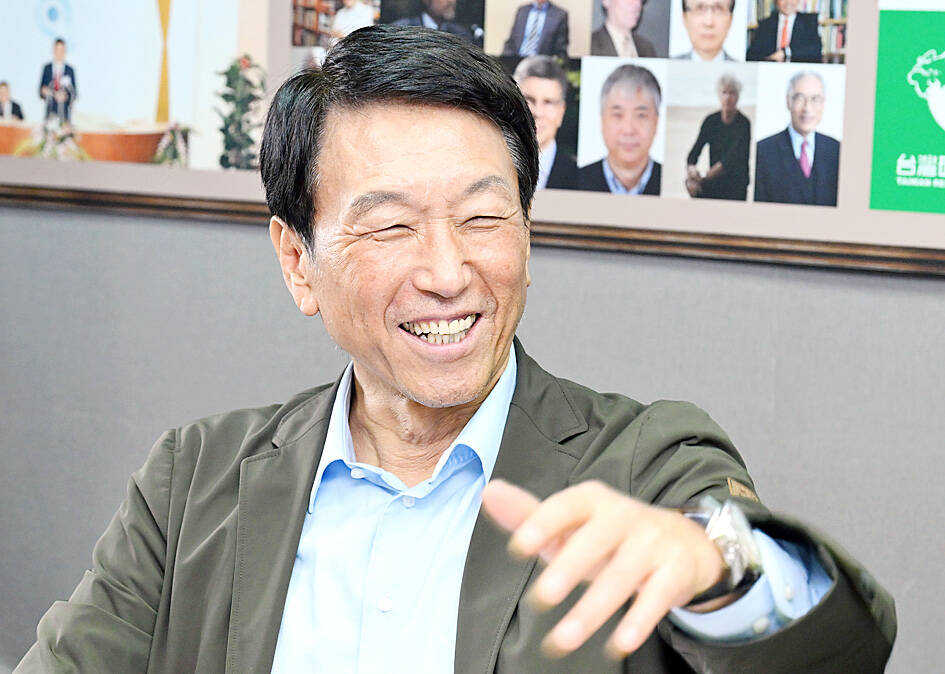Taiwan’s armed forces must learn to embrace innovation, accept risks and confront problems with honesty to get out of the doldrums of “preparing for yesterday’s war,” retired admiral Lee Hsi-ming (李喜明), former chief of the general staff, told a news conference at the Taipei School of Economics and Political Science Foundation on Friday.
The foundation held the event to release its 2022-2023 Republic of China National Defense Review.
National defense strategy, joint warfare, cyberoperations, strategic reserve forces and self-reliant national defense were the key aspects of defense underscored by the paper, which focussed on providing alternative policies for the government’s consideration, Lee said.

Photo: Liao Chen-huei, Taipei Times
Taiwan faces existential and coercive threats, with China’s utilization of “gray zone” conflict encapsulating the latter, he said, adding that gray zone conflict is characterized by using the threat of force to create fear and intimidation.
Taiwan lacks the sufficient military capability to address coercive threats, which highlights the urgent need for applying asymmetry to national defense in all domains, he said.
Instead of spending its limited resources on larger orders of fighter jets and warships, Taiwan should keep Beijing’s tactics in check by using crewed systems and remaining calm without losing perspective, Lee said.
Some analysts have called attention to the Chinese People’s Liberation Army (PLA) Navy’s construction of new aircraft carriers and argued that these surface combatants could be deployed in a hypothetical blockade of Taiwan, he said.
The analysts are mistaken because they do not grasp that the purpose of the carriers is to serve Beijing’s quest for global hegemony, not be deployed immediately in the Taiwan Strait, Lee’s said.
Chinese carriers are not likely to play a significant role in a war against Taiwan, as they are part of Beijing’s effort to build a first-rate military that can project power on a global scale by 2049, not to be immediately risked in the Taiwan Strait, he said.
Should the PLA launch an attack on Taiwan, its main goal would be to overcome the resistance of defending forces while preventing the US or other nations from interfering with its invasion, he said.
China’s advanced ballistic missiles, submarines and bombers are far more effective weapons in accomplishing these aims than deploying aircraft carriers in an anti-access, area-denial role, Lee said, adding that the US is clearly more troubled by these PLA capabilities.
Regarding cyberwarfare, Lee said that the military’s Information, Communications and Electronic Force Command appears to have neglected the Internet, which does not fall into the military definition of information, communications or electronic warfare.
Contesting the Internet space is a crucial mission that the armed forces of the US and Israel have integrated into their military intelligence services, he said, adding that intelligence is foundational to successful operations on the Internet.

DEFENSE: The National Security Bureau promised to expand communication and intelligence cooperation with global partners and enhance its strategic analytical skills China has not only increased military exercises and “gray zone” tactics against Taiwan this year, but also continues to recruit military personnel for espionage, the National Security Bureau (NSB) said yesterday in a report to the Legislative Yuan. The bureau submitted the report ahead of NSB Director-General Tsai Ming-yen’s (蔡明彥) appearance before the Foreign and National Defense Committee today. Last year, the Chinese People’s Liberation Army (PLA) conducted “Joint Sword-2024A and B” military exercises targeting Taiwan and carried out 40 combat readiness patrols, the bureau said. In addition, Chinese military aircraft entered Taiwan’s airspace 3,070 times last year, up about

A magnitude 4.3 earthquake struck eastern Taiwan's Hualien County at 8:31am today, according to the Central Weather Administration (CWA). The epicenter of the temblor was located in Hualien County, about 70.3 kilometers south southwest of Hualien County Hall, at a depth of 23.2km, according to the administration. There were no immediate reports of damage resulting from the quake. The earthquake's intensity, which gauges the actual effect of a temblor, was highest in Taitung County, where it measured 3 on Taiwan's 7-tier intensity scale. The quake also measured an intensity of 2 in Hualien and Nantou counties, the CWA said.

The Overseas Community Affairs Council (OCAC) yesterday announced a fundraising campaign to support survivors of the magnitude 7.7 earthquake that struck Myanmar on March 28, with two prayer events scheduled in Taipei and Taichung later this week. “While initial rescue operations have concluded [in Myanmar], many survivors are now facing increasingly difficult living conditions,” OCAC Minister Hsu Chia-ching (徐佳青) told a news conference in Taipei. The fundraising campaign, which runs through May 31, is focused on supporting the reconstruction of damaged overseas compatriot schools, assisting students from Myanmar in Taiwan, and providing essential items, such as drinking water, food and medical supplies,

New Party Deputy Secretary-General You Chih-pin (游智彬) this morning went to the National Immigration Agency (NIA) to “turn himself in” after being notified that he had failed to provide proof of having renounced his Chinese household registration. He was one of more than 10,000 naturalized Taiwanese citizens from China who were informed by the NIA that their Taiwanese citizenship might be revoked if they fail to provide the proof in three months, people familiar with the matter said. You said he has proof that he had renounced his Chinese household registration and demanded the NIA provide proof that he still had Chinese